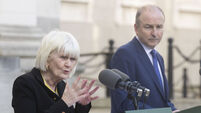Order of Malta inspired Lisa's medical career

Dr Lisa Cunnignham's career in medicine was influenced by her teenage years in the Order of Malta in Ballina.
Dr Lisa Cunningham’s energy is infectious. You can’t help but be impacted by it when in her company.
A consultant in Emergency Medicine at Mayo University Hospital, Lisa has many more passions in her life but her family are at the centre of everything she does.
Lisa is currently involved in a campaign to try and bring pre-hospital emergency medicine to Ireland – and she travels to the UK to practice in the discipline every five to six weeks.
And in the middle of all that, Lisa is also a doctor with the Mayo GAA medical team, a passion project for the Ballina native.
I sat down to chat with Lisa in her home outside Ballina.
Lisa, thank you for talking to me. Tell me a little bit about your background.
I'm from Ballina - born, bred, and buttered in Roches Terrace. I went to school in Ballina, then went on to do medicine in UCD at the tender age of 18. It was probably one of the biggest shocks ever. You could fit Ballina into UCD back then. It was huge, but I loved it.
Is there a reason you wanted to do medicine?
I'm with the Order of Malta here in Ballina for the last 25 years. I developed an interest in First Year in secondary school.
My best friend Denise Gilroy, handed me a first aid book and said, 'Would you just ask me a few questions out of this because I have a test tonight?' I was like, 'Okay, grand' and I thought, 'This looks interesting. What's this?' Then she invited me up to the Order of Malta headquarters in Marian Crescent, and I went in, and I just thought it was really interesting. That's where I started - in the Order of Malta.
I started First Aid and began competing in that - there's actually All-Ireland competitions in First Aid. We won our All Ireland when we were 15 - Denise, myself, another girl called Bláthín and John Lavelle, three of us are now in healthcare. That's where I got the grá for First Aid and even pre-hospital stuff. What I didn't realise at the time was that was actually a sub-speciality of medicine.
What was the next step for you then after you finished in UCD?
The next step is internships. You are unleashed onto the world. It was the first time that they opened up the places, so you didn't need to stay in Dublin. Very quickly, I wanted to get down home to the west.
My first internship was in Galway for the first six months, and then the next six months was in Mayo University Hospital. That was my internship, but you had to choose before Christmas where you'd go to. I had specifically picked Galway to get the Emergency Department rotation there. I did that from October until December. So I had an idea whether I would like that as a speciality. I absolutely loved it.
Galway Emergency Department was just amazing. It really still holds a lovely place in my heart because I went back there several times throughout my rotations.
Then, after the year, you went onto the training scheme. I applied for the training scheme and was successful. Emergency medicine wasn't as much of a speciality back then. That was 2012. You had three years of training then to do and I moved between Galway, Sligo to Portlaoise, then Galway, Sligo, Galway again. So it's three years of training for emergency medicine as a basic scheme, and then you apply to become a Specialist Registrar (SpR), which is a five-year programme, then to become a consultant. It's eight years in total. But I suppose in that I had a few little breaks with that - well, if you could call them breaks because I had three kids along the way.
But it's not just a hospital setting in Ireland that you work in, is it?
I always loved the First Aid aspect of the work. When I really think about it, that's what's driven me to the career that I have now, which is the sub-speciality interest of pre-hospital emergency medicine. Emergency medicine is a speciality and then the sub-speciality is even more going out into the field, as we call it, and delivering the care out there.
As part of my higher training scheme over five years, the last year is a fellowship year, so you could decide what you wanted to do. I went abroad for a full year to Essex and Hearts Air Ambulance in 2020. I went abroad for the year on the helicopters, pre-hospital, and that was it, I knew it was what I wanted to do. It was amazing.
The year finishes, but you have to have a base speciality, which is the emergency medicine. I've always wanted to get back to Mayo but Mayo University Hospital (MUH) was never on the training scheme for emergency medicine. I never actually worked there in the Emergency Department. Actually this year is going to be the first year that we do have trainees there. That was one of our aims when there was a group of us together when we got back, to make MUH a training hospital for emergency medicine.
So I always wanted a job back in Mayo University Hospital. The opportunity arose just as I was coming to the end of the fellowship that the job was going to be back in Mayo. I got a base speciality there and then another air ambulance service in the UK advertised for a job just for two shifts a month, every five to six weeks. I was able to do my base speciality and then do my sub-speciality. I fly over to the UK every five or six weeks now to Lincolnshire and Nottinghamshire Air Ambulance. I absolutely love it.
You're travelling to the UK to do that - is that type of medicine available in Ireland?
There's none of that in medicine in Ireland. This is the reason why you do your fellowship. You go abroad to get a taste of something that is impacting on patient care and doing very well, and then you bring it home. I'm part of an international group, we're all Irish mainly, but I'm the only one that's living in Ireland, the rest of us are abroad. There are pilots, critical care paramedics, other consultants in emergency medicine and pre-hospital physicians, that are all advocating that we have pre-hospital emergency medicine in Ireland. There's definitely a little bit more momentum coming to it.
What is the difference between what happens here and in the UK?
It is important to say that the National Ambulance Service have a very good scope of practice. They are my colleagues. The main difference is the level of care, of critical care interventions that can be done. For example, in the UK, we will deliver the emergency room, emergency department care to the patient's roadside or in their house. If they need a blood transfusion, if they need to be put into a medical coma, if they need extra medications, we will deliver that to them at their bedside, roadside, wherever it is.
In Ireland, the National Ambulance Service will bring the patient to the emergency department. However, in Mayo, that could be an hour, an hour and a half, and if somebody needs a blood transfusion, sometimes that's not the time-frame that they have.
We're very much campaigning, working with the National Ambulance Service, working with the politicians - we're waiting to hear back from Minister for Health Stephen Donnelly and the Taoiseach has said that he's going to engage with us as well to get this implemented in Ireland. This international group, we have a plan right down to the euro, right down to a recruitment drive to actually bring consultants into the country, right down to where the bases will be, right down to the costing for the fuelling.
You're also very involved in GAA, Lisa.
I never played Gaelic when I was younger, but I was brought up in Mayo/Galway household. Playing was never really encouraged for us growing up but I always loved going to games. Being a pre-hospital doctor, I thought maybe my skillset can be used in the Gaelic pitch.
Michael Moyles asked me about four years ago to join the Mayo ladies and I just remember being so excited. I got involved with the girls and I just absolutely love it. It's giving me my Gaelic kick, for starters. But actually, I feel like that I can do some things, I can actually help them in some way.
There's no doctor requirement in the LGFA, so there's not many counties that would have a doctor with them. I've definitely seen a lot of injuries with the girls. They get broken bones, they get broken jaws, they get double the ACLs than the men do, even having pain management and stuff is beneficial.
Dr Mary Casey is also with us. She's a consultant radiologist in Mayo University Hospital. Dr Sean Moffat is the main doctor with the men's team, and he asked me if I wanted to get involved with them as well. I absolutely love doing the two. Even take the first year doing the cardiac screening for the ladies, Saoirse Lally was found to have a condition. This is needed and it's free- LGFA sponsor it - but it's hard for other teams to implement it because there's no doctor there to actually start it.
What keeps you driven, Lisa?
I know from the work part, it's the patient. I know it sounds like such a cliche, but I love having the ladies that come to the emergency department, the 85-year-old, and having a good chat with them, asking them do they remember Mayo winning the last All-Ireland and then there is my role in helping the patient who is bleeding out at the side of the road and knowing that I can do that, and I could go between the two. I have a wonderful family around me, and I'm just enjoying it, I'm happy and healthy. That's what I think everybody should aim for, and that's what it is.





